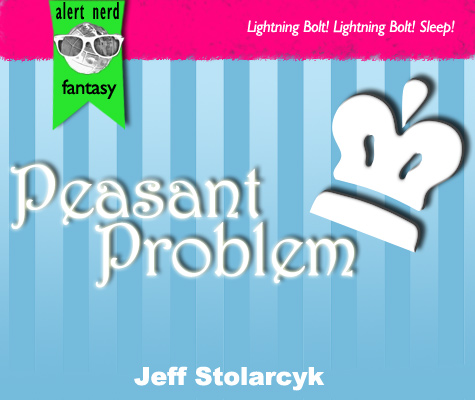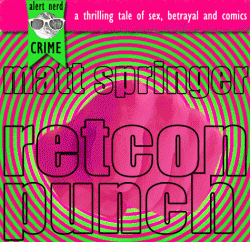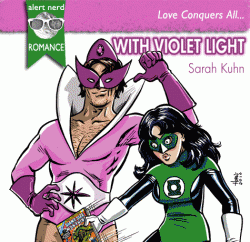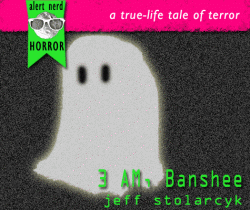(500) Days of MPDG?
(500) Days of MPDG?
Aug 18Today, on Twitter, Caroline started up a convo about the Manic Pixie Dream Girl archetype and why it’s bad/whether women should ‘take it back’. As is the natural course of such conversations, various parties threw out their favorite MPDG characters and, of course, Zooey Deschanel – or more accurately Summer, from Marc Webb’s (500) Days of Summer – got tossed out. While ZD kind of emanates MPDG constantly like an immortal firefly trapped in some sort of nerd crush object mason jar, though, I don’t think that Summer fits the bill at all.
Summer isn’t a typical Omega Male romcom, though it looks suspiciously like one at times. Ultimately, it exposes the main problem with the OM/MPDG relationship as it’s presented in the type of movie that I’ll datedly call a ‘Zach Braff Film’: that it is obsessed with its gloomy male protagonist to the point that the female lead is an extension of the male lead, a panacea to his dysfunctions, and nothing more. Which is fine, I guess, if you’re telling a story about a guy who gets over because of the love of a good woman. But is that the best version of the story you could be telling? UP told that story in two minutes and then kept going and treated Carl and Ellie as a unit (so much so that her absence through much of the film is like a character itself). Don’t luxuriate on it for ninety minutes unless you have something new to say, right?
But Summer….
Summer is a movie about Tom trying to make his life into a Zach Braff Film. He lays that template over Summer Finn, and is completely blind (though the audience is not) to the fact that she doesn’t fit inside the confines of it. Though she initially appears manic and pixieish because of her fear of commitment and her reticence, she is neither. She is operating in a system that she believes in and is comfortable with.
The point, of course, is that Tom is a self-defeating ass. It’s only after he finishes with Summer that he’s able to kickstart his artistic dreams. Staying with her – staying with that fantasy version of what your life wants to be – was only going to make him stagnant and complacent.
And yes, the Autumn thing at the end of the film is a groaner, but it doesn’t undermine the message of the movie, chiefly because – on the surface, in the few moments we have with her – she is a better fit for Tom, and Tom has changed enough to ask her out. She seems neither M nor P and is his peer (a fellow architect), while Summer, as a secretary, was a rung beneath him (is that classist? Maybe? It’s there in the film, it’s not just me I swear).
What do you think? Who is your favorite Manic Pixie Dream Girl? Are they always a bad thing?










As you may no, my secret motive in tweeting about MPDG’s was to get Kieron Gillen to talk to me on Twitter. . .
Well, not really, but it was pretty cool because Kieron Gillen rocks. But — what was my point? Oh, yes, KG said, more or less, that he thinks the MPDG story can be a problem and for that reason he decided to deconstructed it in Phonogram 2 (have you read that, Jeff? Do you think that the Mark/”She” story is doing a similar thing to what you’re saying about 500 Days, or is that a different kind of deconstruction?)
But anyway, another thing Gillen said is that if you say MPDG’s are always bad then you are basically saying ‘Breakfast at Tiffany’s’ and ‘Annie Hall’ suck, which (at least to me) is ridiculous. (Or, well, if they suck, I think it’s safe to say they suck for reasons separate from the characterization of Holly Golightly and Annie Hall). And finally he suggested there was a problem here related to the TVTropes related attitude that just because you can recognize a trope the story is bad.
I’m trying to figure out how I feel about that. I think in one hand the ‘trope-hunting’ mentality is a natural (and healthy) reaction to the dominance for a long time of the attitude that recognizable archetypes/characters/storytelling choices were inherently a GOOD thing. I’m not exactly blaming George Lucas for this, much less Joseph Campbell, but once you hear too much about how everything is a heroes’ journey (and, if it isn’t, it should be) before we start turning into the dude from ‘Rubicon’ and seeing patterns everywhere. (That’s probably not a good analogy, since nobody is watching Rubicon, and also I think we’re supposed to think that guy is right, but I may be straying from the subject.)
But, uhh, yeah, after a while, it looks like a mirror image of high school English. You know, when you would pick out how everything was a symbol and what it represented and feel you’d beaten the story, no matter if you had actually gained a richer understanding of it.
What was my point? Oh, yes. I think if trope-spotting is here to stay as a tool of criticism, we have to make sure we figure out why we thought the trope was bad (or overused) in the first place. Sometimes I think that the whole MPDG conversation just started because some guy was looking for a clever way to say that ‘Garden State’ sucked. (I know, technically, it was ‘Elizabethtown’, but really ‘Elizabethtown; is a way better movie than ‘Garden State’ and the guy would probably have enjoyed ‘Elizabethtown’ more if he had never allowed ‘Garden State’ to seep into his brain matter.
But, well, once the trope’s been spotted, does it lose some of its power? Is it only people who keep using it without examining it that are the problem, or do a bunch of people suddenly start deconstructing the trope and make it worse.
This comment is longer than your article at this point. Ooops.
I think you’re absolutely right about Summer. I think part of the problem was the marketing. I went into (500) Days of Summer thinking it was going to be a generic MPDG film and was dreading it — I only went because my friends were going. And I was passive-aggressively tweeting through the whole first half about its genericness. But slowly I saw how it was morphing into a critique, and I started liking it a lot more.
For what it’s worth, I actually really liked Garden State the first time I saw it, but I was in high school at the time and hadn’t really thought about the MPDG as a thing. I wonder what I’d think of it if I saw it again, with a more critical eye?
Caroline: I think that the Mark issue of Phonogram 2 is very much in the same vein (of course I’ve read Phonogram 2. I would read everything KG and McKelvie do).
As for tropes losing their power once they’ve been spotted, I don’t know that I agree with that. Maybe over some people. But I’ve always been willing to be my media’s accomplice. I think the anti-trope crowd either can’t or won’t do that.
Jennifer: I know what you mean about the marketing. If I weren’t such an easy mark for romcoms and a fan of JGL, I’d have probably skipped it entirely based on commercials.
I was being a *little* flip about ‘Garden State.’ I am sure there are very valid reasons to like it. A better way to put it would be that I sometimes think people invent a whole trope to criticize and then try to shoehorn things into it, rather than just talking about why they thought a particular movie was bad.
But Summer WAS an MPDG. She meets all the criteria: she is two-dimensional, has no life of her own, no friends or family, and doesn’t interact with anyone but Tom. She exists more or less solely to get him over/through that MPDG loving phase. Don’t get me wrong, I really liked the film and LOVE Zooey. But Summer clearly is an MPDG.
Also, Garden State > Elizabethtown. The characters are more interesting, the story is better written, and Natalie Portman is more than a cutout here as opposed to Kirsten Dunst in Elizabethtown. Tho I will say that Claire is the archetypal MPDG.
Patrick, I’d argue that we view her as an MPDG because that’s all that Tom can see her as – the heroine who will save him by teaching him about love and whimsy. We don’t see her interact with other people because Tom only wants to see her interacting with him and when he finds out that she has friends that aren’t his friends, etc. he gets jealous. She is an MPDG based on the perspective of an unreliable narrator.